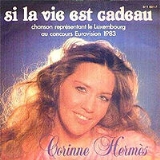"Si la vie est cadeau" by Jean-Pierre Millers (music) and Alain Garcia (lyrics), was the winner of the
Eurovision Song Contest 1983The Eurovision Song Contest 1983, the 28th in the series, was held in Munich, then West Germany, on 23 April 1983. The presenter was Marlene Charell. Corinne Hermes was the winner of this Eurovision with the song, "Si la vie est cadeau". This was Luxembourg's fifth victory in the contest which...
, performed in
FrenchFrench is a Romance language spoken as a first language in France, the Romandy region in Switzerland, Wallonia and Brussels in Belgium, Monaco, the regions of Quebec and Acadia in Canada, and by various communities elsewhere. Second-language speakers of French are distributed throughout many parts...
by
FrenchThe French Republic , The French Republic , The French Republic , (commonly known as France , is a unitary semi-presidential republic in Western Europe with several overseas territories and islands located on other continents and in the Indian, Pacific, and Atlantic oceans. Metropolitan France...
singer
Corinne HermèsCorinne Hermès is a French singer.She represented Luxembourg at the Eurovision Song Contest 1983 where she won with "Si la vie est cadeau" with music by Jean-Pierre Millers and words by Alain Garcia.-External links: * at Bide et Musique...
for
LuxembourgLuxembourg , officially the Grand Duchy of Luxembourg , is a landlocked country in western Europe, bordered by Belgium, France, and Germany. It has two principal regions: the Oesling in the North as part of the Ardennes massif, and the Gutland in the south...
.
The song is a dramatic ballad dealing with the wonder of life, likening it to a gift. The lyrics tell of the singer's suffering in love with a man;
"who promised her the whole world" and did not follow through,
"what about the baby I wanted to give to you in the spring?". She then sings that any kind of gift is welcome, whether it be given, stolen or returned, and warns that the good times are too short, implying that the listener should savor them for all they are worth. Hermès also recorded the song in English and German, as "Words of Love" and "Liebe gibt und nimmt" ("Love Gives and Takes") respectively.
The song was performed 20th (last) on the night, following
BelgiumBelgium , officially the Kingdom of Belgium, is a federal state in Western Europe. It is a founding member of the European Union and hosts the EU's headquarters, and those of several other major international organisations such as NATO.Belgium is also a member of, or affiliated to, many...
's
Pas de DeuxPas de Deux were a Belgian band, best known for their participation in the 1983 Eurovision Song Contest, and the controversy surrounding their selection as that year's Belgian representatives...
with "
Rendez-vous"Rendez-vous" was the Belgian entry in the Eurovision Song Contest 1983, performed in Dutch by Pas de Deux.The song was performed nineteenth on the night...
". At the close of voting, it had received 142 points, placing 1st in a field of 20. The win brought Luxembourg equal with
FranceThe French Republic , The French Republic , The French Republic , (commonly known as France , is a unitary semi-presidential republic in Western Europe with several overseas territories and islands located on other continents and in the Indian, Pacific, and Atlantic oceans. Metropolitan France...
on five Contest wins apiece, however both countries would later be eclipsed by the
Republic of IrelandIreland , described as the Republic of Ireland , is a sovereign state in Europe occupying approximately five-sixths of the island of the same name. Its capital is Dublin. Ireland, which had a population of 4.58 million in 2011, is a constitutional republic governed as a parliamentary democracy,...
, which would win seven.
Compared to the previous year's Eurovision winners, "Si la vie est cadeau" only proved to be a moderate commercial success, peaking at #2 in France, #3 in Belgium, #12 in Ireland, #13 in Sweden, #14 in Switzerland, #31 in the Netherlands and failing to chart in most other European countries.
The song was succeeded in 1984 as winner of the Contest by
HerreysHerreys, or Herrey's, is a Swedish pop group, consisting of the three Mormon brothers Per Herrey , Richard Herrey and Louis Herrey . They won the Eurovision Song Contest 1984 with the song "Diggi-Loo Diggi-Ley". In 1985, they won the Sopot International Song Festival with "Sommarparty på Stranden"...
representing
SwedenSweden , officially the Kingdom of Sweden , is a Nordic country on the Scandinavian Peninsula in Northern Europe. Sweden borders with Norway and Finland and is connected to Denmark by a bridge-tunnel across the Öresund....
with "
Diggi-Loo Diggi-Ley"Diggi-Loo Diggi-Ley" was the winning song in the Eurovision Song Contest 1984 performed in Swedish by a trio of brothers named Herrey's. Lyrics were written by Britt Lindeborg, and the tune by Torgny Söderberg...
".
It was succeeded as Luxembourgish representativeLuxembourg was one of the countries to participate in the first Eurovision Song Contest in 1956.From their debut to 1993 Luxembourg competed frequently in the Contest, being absent from the contest once during this period...
at the 1984 ContestThe Eurovision Song Contest 1984 was the 29th Eurovision Song Contest and was held on 5 May 1984 in Luxembourg. The presenter was Désirée Nosbusch. Nosbusch, only 19 years old at the time, hosted the show in a lax manner, which was quite unusual for this show back then...
by Sophie CarleSophie Carle is a Luxembourgian actress and singer. She has appeared in several films, and represented her country in the 1984 Eurovision Song Contest with the song "100% d'amour"...
with "100% d'amour".
Sources and external links
The source of this article is
wikipedia, the free encyclopedia. The text of this article is licensed under the
GFDL.


